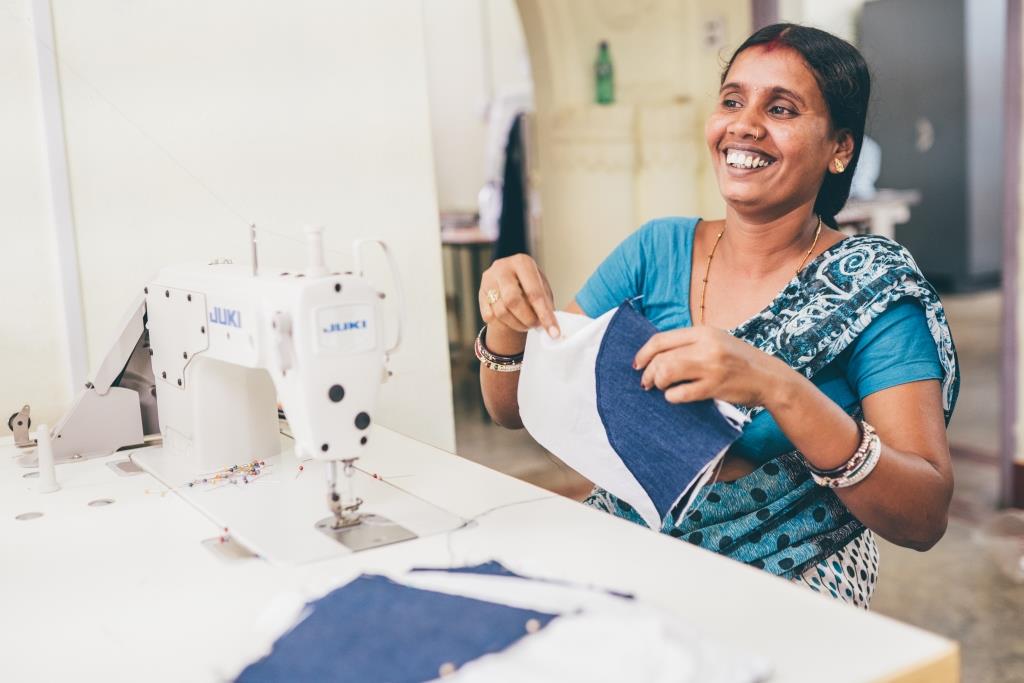
Ana Wilkinson-Gee from Holi Boli talks sisterhood, empowerment and lifting others up
Ana Wilkinson-Gee has been enamored with India for as long as she could remember. As a pattern-maker, she easily fell in love with the country, its vibrant colours and their beautiful fabrics.
After visiting India in 2006, Ana was left with a deep conviction to use her skills in fashion design to empower rural women. In 2010, she relocated to Odisha, India with her husband Daniel and their three kids. After settling down in a small village called Bhalupali, she started hosting sewing classes for local women to give them the opportunity to make a living for themselves.
Little did she know that her classes would blossom into Holi Boli, an ethical clothing brand that is lifting women in India out of poverty with their eco-friendly garments.
To mark Fashion Revolution Week 2021, we caught up with Ana to chat about how it all began, what ethical fashion means to her and the impact that fair employment has had on her talented artisans.

Ana walking through the Bhalupali village with her close-knit team. Image credits: Holi Boli
What moved you to use fashion as a force for good?
It was a combination of two separate things. The first being my passion for textiles, fabrics and pattern-making and the second, a lifestyle that I had grown up with.
My mum was a nurse and my dad was a builder, carpenter, teacher - kind of an all-rounder genius. We lived in the Solomon Islands and then in Papua New Guinea when I was a teenager so I grew up watching them use their skills to help people in remote places who had so much less than we have in New Zealand. I loved the authenticity of their life. It felt very meaningful and made me think about what I could contribute to help the world be a better place. After high school, I studied fashion design in Christchurch and then looked at how I could share those skills with others.
How did you decide to start an ethical business in India?
I’ve always had this curiosity about India - the culture, the beautiful women wearing these amazing sarees. As someone who loves textiles, India is fabric heaven. Plus, I was pretty much born a vegetarian so when I was presented with a banquet of amazing vegetarian dishes there, I thought, “Wow, I’m home!”.
When we moved in 2010, I started casually hosting sewing classes on treadle machines because that’s what they used there. I taught myself how to use one and how to pattern make saree blouses and harem pants because I wanted the women to know how to make their own style of clothing. As word got around about my classes, it snowballed and I had to rent a bigger space to do it. We ended up with 16 ladies per class for a four month course which I developed a basic curriculum for based on their needs and skills.
Three years after I had started the classes, one of our graduates, Lakshmi, asked if I could give her a job. I hadn’t thought about that because I wasn’t sure how I would finance it as a pattern maker. After a chat with my hubby, we decided that if I could get them to a high international standard of sewing and they made clothing our New Zealand market would want, we could sell those pieces and pay their wages.
So that’s really how Holi Boli was born, through the needs and requests of the local women. As demand grew for our pieces, I could offer another sewing graduate the opportunity to join our staff and Holi Boli organically grew into a business.

A space for women to laugh, learn and enjoy themselves. Image credits: Holi Boli
At fair&good, we love connecting our community to the people who make their products. Could you tell us about your team of artisans?
We've trained over 200 ladies now and in the last two years we haven't held any sewing classes because Holi Boli has expanded so much. We have 21 staff at the moment and we’ve had 3 graduates start their own sewing schools in their respective areas which I absolutely love.
At Holi Boli, we talk a lot about how we are strong women who lift others up. We foster a culture of collaboration and speaking positive things to one another. They learn that the sewing house is a safe space to smile, laugh and enjoy themselves. They also learn in our classes that making mistakes is a good thing and is important for development. Many young women have experienced domestic violence and getting hit at school, and while this isn't exclusive to India, the big difference is that its normalised there. So it’s important to me that they know they are in a safe place to grow and that they are valued and cherished.
We also teach our ladies the importance of quality. Not just quality in our sewing or our top brand thread and organic fabrics, but quality in our discussions. Fostering quality relationships within the team and the students and cultivating a happy atmosphere to work in. These are lessons they get to take home and try with their family.
So they are growing on the inside, feeling more worthy about who they are and how they should be treated. We are a caste-free zone and everyone is treated with the same dignity at our sewing house.
“At Holi Boli, we talk a lot about how we are strong women who lift others up. We foster a culture of collaboration and speaking positive things to one another. They learn that the sewing house is a safe space to smile, laugh and enjoy themselves. ”
When did you realise that Holi Boli could make an impact on the lives of these women?
I honestly had no idea the difference it could make. I just wanted to empower my sisters in villages and hard-to-reach places.
These women are born in small villages, often under a tree or in a field with no birth certificate - so they are fairly invisible. If they are lucky, they learn up to Year 5 in school, possibly up to Year 10 so their education is fairly low. They can’t work in retail because they don’t know numbers well and many don’t have the facilities to get into town. The combination of all these factors hugely restricts what their options are for the future. So when it came time for my sewing classes, these women saw an opportunity to gain a skill for life.
I’ve had the privilege of hearing so many stories of their triumph. For many of them, it’s the first certificate they have ever received. I’ve heard them say things like “my brother can’t look down at me now” or “I’m finally good at something”. Just witnessing the transformation of how they think and feel about themselves makes it all worth it.

At Holi Boli, women are given the opportunity to make a living for themselves. Image credits: Holi Boli
Is there a particular moment in your journey that stood out to you?
Where to begin! There are so many, but I’ll tell you about Sasmita. When Sasmita first showed up at our sewing house she was extremely skinny. I eventually found out that she had not one, but three stillbirths. So she had returned to her parents’ village, Bhalupali and attended our sewing classes as part of her healing process.
She had a natural affinity for the sewing machine and after seeing the quality of her sewing, I thought I would love for her to join our staff at Holi Boli. But she had to go back to her husband’s village and couldn’t work for us at the time. I was really disappointed but I told her “if you ever need a job, come find me”. About 6 months later, she came back and asked to work with Holi Boli! She said her husband, who is a carpenter, was having trouble finding work and she needed to earn some money. And I was thinking “Absolutely!” - it was really exciting.
After two years, she fell pregnant again and I immediately felt nervous for her, knowing her history. But this time was different. I enjoyed watching her let out the seams of her saree blouses because she was filling out and could actually afford to eat three meals a day. We paid her throughout her pregnancy and maternity leave. I was overjoyed when I eventually heard that she had a healthy baby. It was beautiful to see what happened when she was getting paid more than a living wage, when she was able to secure an education and could come to work in a safe space.
To me, that’s what ethical fashion is all about - it’s a fair industry where everyone is paid and treated fairly.

Sasmita happily working at the Holi Boli sewing house. Image credits: Holi Boli
What does the Fashion Revolution movement mean to you as an ethical business owner?
I’m grateful to Fashion Revolution for taking hold of the heartbreaking Rana Plaza tragedy and using it to make a difference. I think their movement and documentaries like The True Cost have been great resources for us in New Zealand and other privileged countries to learn from and open our eyes to the horrors of this secretive industry.
Fashion Revolution has done a great job creating awareness around these issues and now consumers can see that it’s within their power to change that. People are now realising that when they pay the right, fair price for a garment, women like Sasmita get to have a baby. It’s that connected.
We love to take part in Fashion Revolution every year. It gives us small brands an opportunity to be heard because we’re all singing the same song and it makes more of an impact. At the sewing house, there’s always a buzz during Fashion Revolution Week. This year the ladies have got their signs out again, they all know what it’s about and it feels like we are part of a bigger team of like minded businesses. As a business owner who is tucked away in a village, fairly unseen from the world, it makes me feel like I’m not alone in trying to change the world.

The Holi Boli team love taking part in Fashion Revolution Week every year. Image credits: Holi Boli
How do you think the New Zealand fashion industry has evolved since Fashion Revolution?
I think it has been going really good. It’s been cool to see the increase of awareness surrounding ethical fashion in New Zealand. There are lots of brands who are actively bringing freedom to people within the fashion supply chain and making their process more transparent.
Ethically Kate is a champion for promoting an ethical lifestyle - not just in the clothes we wear, but how we can live better and look after our planet. I’m also loving the spirit of collaboration over competition. We often get emails from other brands asking us for help because they want to source and produce their clothes ethically. I think that’s a really positive change and I truly believe that the more we support each other, the more we grow our impact.
We openly share who our fabric suppliers are on the Holi Boli website and while that is partly because of our commitment to transparency, we hope that other designers will see our resources and reach out to work with those suppliers. Because at the end of the day, we’re all on the same team.
Apart from shopping ethical fashion, how can consumers be part of the Fashion Revolution movement?
I’d say the Internet has been a useful tool for opening our eyes to these issues and creating awareness. The best way for people to get involved is to share information and links about Fashion Revolution, watch documentaries like The True Cost and encourage their friends and family to get on board. They can also look to resources like fair&good, where a team of people have already combed through a million brands to find the ones that match their ethos and share them so that other people know they exist.

“Let’s woman up and have the freedom to be who we are!” - Ana. Image credits: Holi Boli
Where do you draw inspiration from for your pieces?
Oh, everywhere! I think everything can be inspirational. I love the colour combinations that nature throws at us and that’s where a lot of our colour palettes come from. I also love plant based fabrics and I’m always encouraging people to wear natural fabrics like organic cotton and linens. Not only do they feel better, but they breathe better.
As far as designs, all our collections have a feminist streak in them. Being in India, as you can imagine, it’s not always a good thing to be born a girl child and I’ve heard lots of stories along that dialogue. So through our designs with Holi Boli, there is a message that we should embrace our femininity and wear it proudly. I think in the business world, even in the West, there is an unsaid rule that we have to look masculine and play down our feminie qualities which is very oppressive. With my designs, I’m trying to change that narrative; we can be strong women in business and still have gathers or frills on our sleeves. Instead of feeling like you have to “man up”, I say let’s woman up and have the freedom to be who we are.

Transformational business is what drives Ana to keep going. Image credits: Holi Boli
What’s next for Holi Boli?
We’ve had two new stockists come on board with us so we’re trying to promote where people can find Holi Boli in Wellington and in the Waikato region. We’re also launching a new summer collection later in the year that’s centred around collaboration, which is a big thing for us. We’ll be working closely with an amazing American lady called Andrea based in North India, who has an ethical clothing brand called Swahlee. And we’re also working with another team of women in Cambodia to produce this collection so that’s very exciting. We’re looking forward to doing more collaboration and growing our reach to help more women around the world.
What gets you up every morning?
Doing transformational business. It’s not just a job, I live and breathe it. I live for sharing what we have with our sisters on the other side of the world. It’s too different, the resources we have here and what they have. And it’s not fair. They are our sisters and we are one family living in a global neighbourhood. So to see these women uplifted, empowered and see them realise that they are worthy - that's what I live for.



















